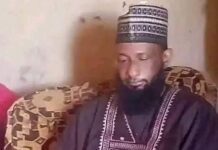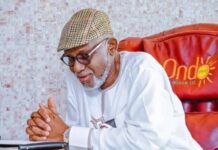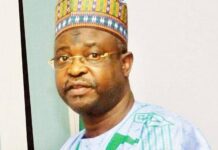By
Chris Paul Otaigbe
Since the day you left me I waged war to stop the unholy yearning for you. I avoided you, fearing I might become a wild dog. I waited for the day I’d stop caring about you. Waiting”
― Tapiwa Mugabe, Zimbabwe…
Robert Mugabe is dead but his memories, good, bad or ugly, live on after him. One of the many statements, he would be remembered for, during his several exchange with Tony Blair, then the UK Prime Minister was “…Blair should keep his England and allow me to keep my Zimbabwe…”
For Mugabe, Zimbabwe was his personal property and a national project, he personalized.
He became prime minister of Zimbabwe in 1980 and served as the country’s president from 1987 until his forced resignation in 2017.
The events of his life were shaped in his childhood days; the sentiments that saturated his thinking, even in matters concerning affairs of State, while the temperament with which he responded to issues, personal, national and global, reflected the biases and influences that characterized his experience in his days as a child. His founding and major inspiration came from an Irishman, Father Jerome O’Hea.
Robert Gabriel Mugabe was born on 21 February 1924 at the Kutama Mission village in Southern Rhodesia’s Zvimba District.
His father, Gabriel Matibiri, was a carpenter, while his mother Bona taught Christian catechism to the village children.
They had been trained in their professions by the Jesuits, the Roman Catholic apostolic order which had established the mission. Bona and Gabriel had six children: Miteri (Michael), Raphael, Robert, Dhonandhe (Donald), Sabina, and Bridgette.
They belonged to the Zezuru clan, one of the smallest branches of the Shona tribe. Mugabe’s paternal grandfather was Constantine Karigamombe, alias “Matibiri”, a strong powerful figure, who served King Lobengula in the 19th century.
The Jesuits were strict disciplinarians and under their influence Mugabe developed an intense self-discipline, while also becoming a devout Catholic. Mugabe excelled at school, where he was a secretive and solitary child, preferring to read, rather than playing sports or socializing with other children. He was taunted by many of the other children, who regarded him as a coward and a mother’s boy.
Around 1930, Gabriel had an argument with one of the Jesuits, and as a result, the Mugabe family was expelled from the mission village by its French leader, Father Jean-Baptiste Loubière.
The family settled in a village about seven miles away; the children were permitted to remain at the mission primary school, living with relatives in Kutama during term-time and returning to their parental home on weekends.
Around the same time, Robert’s older brother Raphael died, likely of diarrhea. In early 1934, Robert’s other older brother, Michael, also died, after consuming poisoned maize. Later that year, Gabriel left his family in search of employment at Bulawayo. He subsequently abandoned Bona and their six children and established a relationship with another woman, with whom he had three further offspring.
Loubière died shortly after and was replaced by an Irishman, Father Jerome O’Hea, who welcomed the return of the Mugabe family to Kutama. In contrast to the racism that permeated Southern Rhodesian society, under O’Hea’s leadership the Kutama Mission preached an ethos of racial equality. O’Hea nurtured the young Mugabe; shortly before his death in 1970 he described the latter as having “an exceptional mind and an exceptional heart”.
As well as helping provide Mugabe with a Christian education, O’Hea taught him about the Irish War of Independence, in which Irish revolutionaries had overthrown the British imperial regime. After completing six years of elementary education, in 1941 Mugabe was offered a place on a teacher training course at Kutama College. Mugabe’s mother could not afford the tuition fees, which were paid in part by his grandfather and in part by O’Hea.
As part of this education, Mugabe began teaching at his old school, earning £2 per month, which he used to support his family. In 1944, Gabriel returned to Kutama with his three new children, but died shortly after, leaving Robert to take financial responsibility for both his three siblings and three half-siblings. Having attained a teaching diploma, Mugabe left Kutama in 1945.
He taught at various schools around Southern Rhodesia, among them the Dadaya Mission school in Shabani. There is no evidence that Mugabe was involved in political activity at the time, and he did not participate in the country’s 1948 general strike. In 1949 he won a scholarship to study at the University of Fort Hare in South Africa’s Eastern Cape.
There he joined the African National Congress, and attended African nationalist meetings, where he met a number of Jewish South African communists who introduced him to Marxist ideas. He later related that despite this exposure to Marxism, his biggest influence at the time were the actions of Mahatma Gandhi during the Indian independence movement.
In 1952, he left the university with a Bachelor of Arts degree in history and English literature. In later years he described his time at Fort Hare as the “turning point” in his life.
Mugabe returned to Southern Rhodesia in 1952, by which time—he later related— he was “completely hostile to the [colonialist] system”. Here, his first job was as a teacher at the Driefontein Roman Catholic Mission School near Umvuma.
In 1953 he relocated to the High field Government School in Salisbury’s Harare township and in 1954 to the Mambo Township Government School in Gwelo. Meanwhile, he gained a Bachelor of Education degree by correspondence from the University of South Africa, and ordered a number of Marxist tracts—among them Karl Marx’s Capital and Friedrich Engels’ The Condition of the Working Class in England—from a London mail-order company.
Despite his growing interest in politics, he was not active in any political movement. He joined a number of inter-racial groups, such as the Capricorn Africa Society, through which he mixed with both black and white Rhodesians. Guy Clutton-Brock, who knew Mugabe through this group, later noted that he was “an extraordinary young man” who could be “a bit of a cold fish at times” but “could talk about Elvis Presley or Bing Crosby as easily as politics”.
From 1955 to 1958, Mugabe lived in neighboring Northern Rhodesia, where he worked at Chalimbana Teacher Training College in Lusaka. There he continued his education by working on a second degree by correspondence, this time a Bachelor of Administration from the University of London International Programmes through distance and learning.
In Northern Rhodesia, he was taken in for a time by the family of Emmerson Mnangagwa, whom Mugabe inspired to join the liberation movement and who would later go on to be President of Zimbabwe.
In 1958, Mugabe moved to Ghana to work at St Mary’s Teacher Training College in Takoradi. He taught at Apowa Secondary School, also at Takoradi, after obtaining his local certification at Achimota College (1958–1960), where he met his first wife, Sally Hayfron.
According to Mugabe, “I went [to Ghana] as an adventurist. I wanted to see what it would be like in an independent African state”. Ghana had been the first African state to gain independence from European colonial powers and under the leadership of Kwame Nkrumah underwent a range of African nationalist reforms; Mugabe reveled in this environment. In tandem with his teaching, Mugabe attended the Kwame Nkrumah Ideological Institute in Winneba.
He later claimed that it was in Ghana that he finally embraced Marxism. He also began a relationship with a Ghanaian woman, Sally Hayfron, who worked at the college and shared his political interests.
While Mugabe was teaching abroad, an anti-colonialist African nationalist movement was established in Southern Rhodesia. It was first led by Joshua Nkomo’s Southern Rhodesia African National Congress, founded in September 1957 and then banned by the colonial government in February 1959. SRANC was replaced by the more radically oriented National Democratic Party (NDP), founded in January 1960.
In May 1960, Mugabe returned to Southern Rhodesia, bringing Hayfron with him. The pair had planned for their visit to be short, however Mugabe’s friend, the African nationalist Leopold Takawira, urged them to stay.
In July 1960, Takawira and two other NDP officials were arrested; in protest, Mugabe joined a demonstration of 7,000 people who planned to march from High field to the Prime Minister’s office in Salisbury.
The demonstration was stopped by riot police outside Stoddart Hall in Harare township. By midday the next day, the crowd had grown to 40,000 and a makeshift platform had been erected for speakers. Having become a much-respected figure through his profession, his possession of three degrees, and his travels abroad, Mugabe was among those invited to speak to the crowd.
Following this event, Mugabe decided to devote himself full-time to activism, resigning his teaching post in Ghana (after having served two years of the four-year teaching contract).
He chaired the first NDP congress, held in October 1960, assisted by Chitepo on the procedural aspects. Mugabe was elected the party’s publicity secretary. He consciously injected emotionalism into the NDP’s African nationalism, hoping to broaden its support among the wider population by appealing to traditional cultural values.
He helped to form the NDP Youth Wing and encouraged the incorporation of ancestral prayers, traditional costume, and female ululation into its meetings. In February 1961, he married Hayfron in a Roman Catholic ceremony conducted in Salisbury; she had converted to Catholicism to make this possible.
The British government held a Salisbury conference in 1961 to determine Southern Rhodesia’s future. Nkomo led an NDP delegation, which hoped that the British would support the creation of an independent state governed by the black majority.
Representatives of the country’s white minority—who then controlled Southern Rhodesia’s government—were opposed to this, promoting continued white minority rule.
Following negotiations, Nkomo agreed to a proposal which would allow the black population representation through 15 of the 65 seats in the country’s parliament. Mugabe and others in the NDP were furious at Nkomo’s compromise. Following the conference, Southern Rhodesia’s African nationalist movement fell into disarray. Mugabe spoke at a number of NDP rallies before the party was banned by the government in December 1961.
Many of its members re-grouped as the Zimbabwe African People’s Union (ZAPU) several days later, with Mugabe appointed as ZAPU’s publicity secretary and general secretary.
Racial violence was growing in the country, with aggrieved black Africans targeting the white community. Mugabe deemed such conflict a necessary tactic in the overthrow of British colonial dominance and white minority rule.
This contrasted with Nkomo’s view that African nationalists should focus on international diplomacy to encourage the British government to grant their demands. Nine months after it had been founded, ZAPU was also banned by the government, and in September 1962 Mugabe and other senior party officials were arrested and restricted to their home districts for three months. Both Mugabe and his wife were in trouble with the law; he had been charged with making subversive statements in a public speech and awarded bail before his trial.
Hayfron had been sentenced to two years imprisonment—suspended for 15 months—for a speech in which she declared that the British Queen Elizabeth II “can go to hell”.
The rise of African nationalism generated a white backlash in Southern Rhodesia, with the right-wing Rhodesian Front winning the December 1962 general election. The new government sought to preserve white minority rule by tightening security and establishing full independence from the United Kingdom. Mugabe met with colleagues at his house in Salisbury’s Highbury district, where he argued that as political demonstrations were simply being banned, it was time to move towards armed resistance.
Both he and others rejected Nkomo’s proposal that they establish a government-in-exile in Dar es Salaam. He and Hayfron skipped bail to attend a ZAPU meeting in the Tanganyikan city. There, the party leadership met Tanganyika’s President, Julius Nyerere, who also dismissed the idea of a government-in-exile and urged ZAPU to organize their resistance to white minority rule within Southern Rhodesia itself.
In August, Hayfron gave birth to Mugabe’s son, whom they named Nhamodzenyika, a Shona term meaning “suffering country”. Mugabe insisted that she take their son back to Ghana, while he decided to return to Southern Rhodesia. There, African nationalists opposed to Nkomo’s leadership had established a new party, the Zimbabwe African National Union (ZANU), in August; Ndabaningi Sithole became the group’s president, while appointing Mugabe to be the group’s secretary-general in absentia. Nkomo responded by forming his own group, the People’s Caretaker Council, which was widely referred to as “ZAPU” after its predecessor. ZAPU and ZANU violently opposed one another and soon gang warfare broke out between their rival memberships.
Nationalist politician
Mugabe was a Zimbabwean revolutionary and politician who served as Prime Minister of Zimbabwe from 1980 to 1987 and then as President from 1987 to 2017.
As chairman of the Zimbabwe African National Union (ZANU) group from 1975 to 1980, he led its successor political party, the ZANU – Patriotic Front (ZANU–PF), from 1980 to 2017.
Ideologically an African nationalist, he was angry that Southern Rhodesia was a colony of the British Empire governed by its white minority. This made Mugabe to embrace Marxism during the 1970s and 1980s. He would later join African nationalist protests calling for an independent state led by representatives of the black majority.
He identified as a socialist after the 1990s. His policies have been described as Mugabeism.
After making anti-government comments, he was convicted of sedition and imprisoned between 1964 and 1974.
On release, he fled to Mozambique, established his leadership of ZANU, and oversaw ZANU’s role in the Rhodesian Bush War, fighting Ian Smith’s predominantly white government.
He reluctantly took part in the peace negotiations brokered by the United Kingdom that resulted in the Lancaster House Agreement.
The agreement ended the war and resulted in the 1980 general election, at which Mugabe led ZANU-PF to victory. As Prime Minister of the newly renamed Zimbabwe, Mugabe’s administration expanded healthcare and education and—despite his professed Marxist desire for a socialist society—adhered largely to mainstream, conservative economic policies.
Mugabe’s calls for racial reconciliation failed to stem growing white emigration, while relations with Joshua Nkomo’s Zimbabwe African People’s Union (ZAPU) also deteriorated. In the Gukurahundi of 1982–1985, Mugabe’s Fifth Brigade crushed ZAPU-linked opposition in Matabeleland in a campaign that killed at least 10,000 people, mostly Ndebele civilians.
Internationally, he sent troops into the Second Congo War and chaired the Non-Aligned Movement (1986–89), the Organization of African Unity (1997–98), and the African Union (2015–16).
Pursuing decolonization, Mugabe emphasized the redistribution of land controlled by white farmers to landless blacks, initially on a “willing seller–willing buyer” basis. Frustrated at the slow rate of redistribution, from 2000, he encouraged black Zimbabweans to violently seize white-owned farms. Food production was severely impacted, leading to famine, drastic economic decline, and international sanctions. Opposition to Mugabe grew, but he was re-elected in 2002, 2008, and 2013 through campaigns dominated by violence, electoral fraud, and nationalistic appeals to his rural Shona voter base. In 2017, members of his own party ousted him in a coup, replacing him with former Vice President Emmerson Mnangagwa.
Having dominated Zimbabwe’s politics for nearly four decades, Mugabe was a controversial figure. He was praised as a revolutionary hero of the African liberation struggle who helped free Zimbabwe from British colonialism and white minority rule. Critics accused Mugabe of being a dictator responsible for economic mismanagement, widespread corruption, anti-white racism, human rights abuses, and crimes against humanity.
Easily one of the most educated leaders in the world, a BBC Reporter who interviewed Mugabe over seven times, narrated how, in one of his sessions with him, he was in Mugabe’s office, which was filled on this particular day with British Diplomats. “He (Mugabe) was obviously the brightest in the room. He could turn an interview around and humiliate you. He loves doing that on camera…” said the BBC Reporter.
He preached conciliation after a brutal liberation struggle, he led and became the darling of the United Kingdom where the Queen Knighted him.
Over thirty-seven years in power, it was obvious that the reign of Robert Mugabe was not going to end at the ballot box.
The end of his 37-year tenure was met with applause from parliament members, as well as celebrations on the streets of Zimbabwe. According to a spokesman for the ZANU-PF, former vice president Mnangagwa would take over as president and serve the remainder of Mugabe’s term until the 2018 elections.
Just before the elections on July 30, 2018, Mugabe said he could not support his successor, Mnangagwa, after being forced out by the “party I founded,” and suggested that opposition leader Nelson Chamisa of the MDC was the only viable presidential candidate. That drew a strong response from Mnangagwa, who said, “It is clear to all that Chamisa has forged a deal with Mugabe, we can no longer believe that his intentions are to transform Zimbabwe and rebuild our nation.”
Without a doubt the Kutama-born Liberator of Zimbabwe died a bitter man.
According to the Tapiwa Mugabe, Zimbabwe: “You were born to be remembered, not missed. Being missed means you eat up people’s memory, leaving them full of you but empty of themselves.”
That little baby born in Kutama, 95 years ago has grown up to become one, the whole world would miss for different reasons. He is the Mugabe, the whole of Zimbabwe both remember and miss for the experience he brought to bear on their existence as a freedom fighter, a democrat and a despot.











